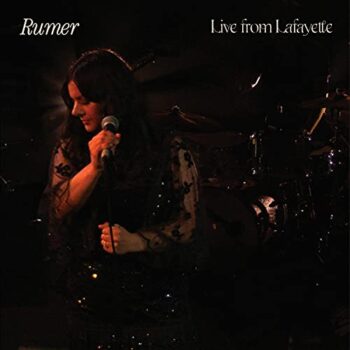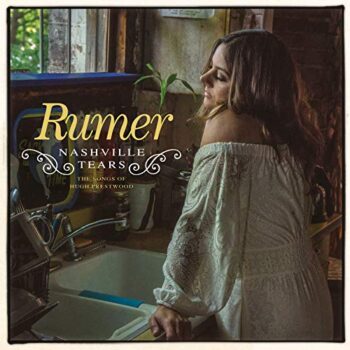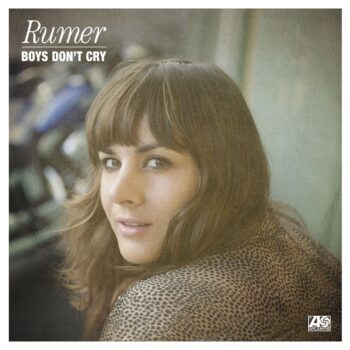Rumer – Live From Lafayette and More: Interview
Rumer has just released a new album, Live From Lafayette. It is a recording of the the British singer-songwriter’s only live performance of 2020 and as such, it holds a unique place in her canon of work.
The 13th Floor’s Marty Duda spoke to Rumer and found her to be open, honest and just a bit vulnerable. She is also opinionated as we discuss Brexit, Animal Rights and Karen Carpenter.
Listen to the interview here:
Or, read a transcription of the interview here:
M: And how are things in London today?
R: Oh, it’s okay. We got a fuel shortage. The some, you know, Brexit? Definitely, there’s been some Brexit consequences that we’re feeling, driver shortages, lorry drivers shortages. A weird atmosphere. And there’s a weird atmosphere in the world in general.
M: There is indeed. It even reaches down to here.
R: So you like New Zealand? That’s an interesting place to find yourself?
M: Yes. I moved here in 1994 from upstate New York.
R: Wow, never looked back?
M: No, it’s the place to be, yeah.
R: It’s supposed to be a very beautiful place.
M: It is indeed. Have you never been here?
R: No.
M: You got to make the scene sometime, come down and play once things open up. I’m just curious, you mentioned Brexit, how is that going to affect touring for you? And folks like you?
R: Well, I think it makes it more complicated from the point of view of getting visas, and things like that. Whereas before, you wouldn’t have to get a visa to go to France or Germany or Italy, you’d have to get…there’d be more paperwork involved. So it’s definitely more complicated, time consuming, expensive. So it could potentially mean that, you know, that only wealthier, more successful artists can tour in Europe. And up and coming, artists will struggle to tour in Europe basically.
M: Its same old story, just a different twist on it, isn’t it?
R: Yeah.
 M: Anyway, and so your album, the live album you just released, is kind of a result of the scenario these days as well, because it was basically a livestream that you performed in front of probably not very many people, I’m assuming.
M: Anyway, and so your album, the live album you just released, is kind of a result of the scenario these days as well, because it was basically a livestream that you performed in front of probably not very many people, I’m assuming.
R: No, no, just the camera crew and a few, you know, stragglers. But you know, it was it was interesting, it was like, it was it was the middle of the pandemic year, it was a, you know, we were trying to do something, everybody was figuring out this whole livestream thing and experimenting with that, and we thought we would too, and, you know, we tried to make as much effort as we could to be as present as we could, despite the challenges. We’ve never done a live stream before. So, you know, everybody was kind of, you know, coming out of their burrows, you know, like, the drummer was staying at their parents’ house, you know, he’d grown a beard. You know, guitarist was like, trying to squeeze into his shirt, you know, everybody was just like, so out of practice and hadn’t played in months and months. So it was like a sort of…we went out cold, pretty cold, you know. But, you know, it was just something we felt like we wanted to connect to people as best we could, you know, even though everybody including the musicians are kind of bewildered as well, about going on.
M: Yep. I mean, it’s got to be strange, just in terms of, you end the song and there’s no applause, I mean
R: Yeah. Yeah, that is weird.
M: And, and for you as a vocalist. I mean, you hadn’t sung I assume, publicly in a long time, and there is no immediate feedback from the audience. So what did you have to do to kind of prepare yourself for that?
R: Just a lot of rehearsals and you know, the nerves do get you on the day, they always do. And so, the unfortunate thing about nerves is that they affect your ability to breathe and steady your breathing so it’s kind of cruel because it’s really hard to sing when you’re nervous. Yeah I was nervous but you know it was it was just a moment in time. It’s just a little postcard from the lockdown you know the album really is sort of a snapshot in time.
M: And did you know you’re gonna release it as an album before you did it or did you…
R: No no no, It wasn’t it was just something… the reason why we did it was just you know, just to keep music out there and you know, create this little snapshot from the pandemic and as a record in time of that time I guess.
M: Did you get much feedback from fans?
R: No, I mean I didn’t look for it. I mean maybe there was but I didn’t look at it.
M: So you try to avoid that kind of stuff. You’re not a big social media interactor?
R: I mean, I do care about people and you know I really am grateful for the people that do care and do come to shows and do engage. Um, but you know, I guess after a show you always so vulnerable that you don’t want to read anything straight after.
M: And does that happen after every show? Do you always feel that way? Or is it was this a special occasion?
R: I think because we were all feeling a little nervous because it was a new thing and we’d come in pretty cold we haven’t played in a long long time.
M: So you had a band of about what, six five folks behind you…so what did you do to get in shape? Just play and play and play?
R: We had two full days rehearsals and you know that’s all we could really…I know another one would have been would have been good…and then we ran the whole thing that day once through.
M: So like a dress rehearsal huh?
R: Yeah.
M: So and putting together the setlist what kind of decisions did you have to make there?
 R: Well, I wanted to…you know at the time I was promoting Nashville Tears, so that was…it was quite Nashville Tears heavy. Usually, I lean heavy on Seasons because it was my, you know, kind of most potent body of work and and then I usually just pick a little from other records. And also the record that I’m promoting. But usually I do play the favourite songs from Seasons Of My Soul and then a selection from whatever I’m currently putting out and then a little bit from each other record
R: Well, I wanted to…you know at the time I was promoting Nashville Tears, so that was…it was quite Nashville Tears heavy. Usually, I lean heavy on Seasons because it was my, you know, kind of most potent body of work and and then I usually just pick a little from other records. And also the record that I’m promoting. But usually I do play the favourite songs from Seasons Of My Soul and then a selection from whatever I’m currently putting out and then a little bit from each other record
M: Let’s see you did a few from Into Colour as well.
R: As I put out more and more material…though to be honest with you it’s getting harder to know what to put in and what to put out, you know, what to keep in, you know, what to not what to do because there’s quite a lot of songs to choose from now.
M: Gotcha. Yeah, well, could be worse could have nothing to choose from. And I see you also did a couple of covers. There’s version of Sarah Smile, why did you choose that?
 R: Well, I did that on my Boys Don’t Cry record, which is my sort of 70s cover record. And my producer at the time that I was working with, Steve Brown on Seasons, he said…you know, he kind of like the idea because my name, my birth name is Sarah. I didn’t like that. But it was cool. And I should do it. And then it kind of became kind of emotional song for me because it spoke to me at a time when I was struggling in the music business and I also…I don’t know if you saw…but I did that with Daryl Hall on Daryl’s House…if you saw that.
R: Well, I did that on my Boys Don’t Cry record, which is my sort of 70s cover record. And my producer at the time that I was working with, Steve Brown on Seasons, he said…you know, he kind of like the idea because my name, my birth name is Sarah. I didn’t like that. But it was cool. And I should do it. And then it kind of became kind of emotional song for me because it spoke to me at a time when I was struggling in the music business and I also…I don’t know if you saw…but I did that with Daryl Hall on Daryl’s House…if you saw that.
M: I haven’t seen it, I’ll have to look it up.
R: Well, yeah, I did.
M: It must have been fun.
R: And he sang it to me. And I was like I was tearing up you can see on the video. I’m just like, he’s singing it to me. I’m tearing up and I am so fragile in that whole episode of Live From Daryl’s House. I’m so fragile because for one I look like I’ve just what I feel like I’ve just walked in to this cool situation with these amazingly cool phenomenal musicians. And I’m just like, ‘You let me in’ and just feel I was so vulnerable. You could have knocked me over with a feather. I was wearing a scarf like almost like I wanted to hide behind it like around my face. Have a look at it. I don’t know. I’m on the edge. Like I’m definitely on the edge in that episode.
M: And the other the other cover you did is a Todd Rundgren tune. Love Is The Answer.
R: That’s a great song. That’s a great song for now, isn’t it?
M: It seems to be it would I’d like to think so. Yeah.
R: I remember first listening to that several years ago, when there was all the problems in Syria, they were starting. And I remember lying under the covers, with just that song playing on a loop. And it was the only thing that was making me feel okay about what was going on out there. That was I was getting me through because I was really feeling it intensely, you know, what was going on out there. So I felt like it was a really powerful song.
M: So are you thinking about what you’re going to do next in terms of your career and recording and all that stuff?
R: Yeah, I’m writing at the moment, I’m writing music. I’m developing, you know, a new sound a new project. I got B sides and rarities coming out early next year, which is a selection of…you know, I did B Sides & Rarities Volume One, which is really just songs that never made it or, you know, broadcasts and it’s just a collection, it’s a compilation of material that hasn’t been put on in one place before. And that’s something you know, for the fans, which is really nice. But really, I’m just focusing on my writing, you know, because I’ve been really a bit of a part timer over the last five years since my son was born. And I’ve kind of really just…I’m really sort of what’s the word? You know something’s got to give when you’re a parent, something’s got to give and it wasn’t going to be my family. So, you know, the career definitely took a backseat and I withdrew quite significantly from this music scene and music business just because I had to focus on other things, you know. I’m gradually kind of getting back in the saddle. And Nashville Tears had a lot to do with that because it was such a fun project and I had such a great time doing it. And I worked with just the most phenomenal musicians. And we laughed and laughed. And it was just a joy. And it was hard work. It was hard work. You know, it was tough going, but we did laugh. And Fred was such a laugh. And we just had a great time. And, you know, that was just an honour and a privilege.
M: Now, if I’m not mistaken, the other thing that you kind of put your attention to is kind of your advocacy against, animal cruelty and things like that. So do you spend much time actively working on that?
M: Well, I used to before I had a child, I used to be fully like engaged in, you know, to the point where, you know, I was picking up dogs from Korea from LAX, I was, you know, personally fostering them. I was doing fundraisers, I was giving all the money from concerts to Korean dogs. It was a big thing in my life, you know, and it still is, but I can’t engage with it in the same way because I have responsibilities now. And I can’t let my emotions be… I can’t let my emotions be that destabilized. I’ve got responsibilities. Because the nature of that kind of work is that you do see the most horrendous material. But back then, you know, I’d be tuning into, you know, debates or…I went to the parliamentary debate on meat trade in South Korea, I actually physically went to Parliament and sat in the, in the gallery, you know, I can’t do that now. You know…marched, all of that. So it’s still really a big piece of my heart that I had to make a decision about, you know, I’m a, I’m a vulnerable person, and I can’t…and I have to keep it together. And now a parent, I have to really keep it together. So a lot has to just take a back seat. You know, I gave it my all. And I will again, but for now, I had to withdraw a little bit from it.
M: Now on a completely different subject, a friend of mine has just written a book about The Carpenters. And he’s in collaboration with Richard Carpenter. And I’m kind of going out on a limb here and guessing that maybe Karen Carpenter’s vocals kind of had an influence on you, but maybe not. But if you had anything to say about her, that would be great.
 R: Yeah, absolutely. I think that, um, Karen Carpenter is one of the greatest singers you know, ever, like Dusty Springfield, you know? But I wouldn’t say that I listened to her any more than any of the other thing is that any of the great singers. I remember when I was a kid, my dad lived abroad, and he used to send videos back, you know, kind of family videos, and then The Carpenters would be on the music. So maybe I had a sentimental attachment to The Carpenters…I mean I played those videos quite a lot. I don’t know. But, um, when I when I met Richard, we talked about old timey music, you know? And we talked about, you know, 78s…you know, I said, I had an old gramophone. He was talking about old 78s. And I said, I had my first record, 78 I bought was Bing Crosby’s Some Enchanted Evening. And he said, ‘Oh, yes, I know, just the one!’ And I thought, ‘This is crazy!’ And I thought, ’This is probably why people say I sound like Karen Carpenter, because I’ve learned to sing listening to people like Bing Crosby. And the old, the old timey music. And I think and I think they did too. So you know, I think we definitely have a share and love for, you know, the American Songbook and old jazz and, you know, that kind of stuff.
R: Yeah, absolutely. I think that, um, Karen Carpenter is one of the greatest singers you know, ever, like Dusty Springfield, you know? But I wouldn’t say that I listened to her any more than any of the other thing is that any of the great singers. I remember when I was a kid, my dad lived abroad, and he used to send videos back, you know, kind of family videos, and then The Carpenters would be on the music. So maybe I had a sentimental attachment to The Carpenters…I mean I played those videos quite a lot. I don’t know. But, um, when I when I met Richard, we talked about old timey music, you know? And we talked about, you know, 78s…you know, I said, I had an old gramophone. He was talking about old 78s. And I said, I had my first record, 78 I bought was Bing Crosby’s Some Enchanted Evening. And he said, ‘Oh, yes, I know, just the one!’ And I thought, ‘This is crazy!’ And I thought, ’This is probably why people say I sound like Karen Carpenter, because I’ve learned to sing listening to people like Bing Crosby. And the old, the old timey music. And I think and I think they did too. So you know, I think we definitely have a share and love for, you know, the American Songbook and old jazz and, you know, that kind of stuff.
M: Well, thank you for that. Yeah. I had a I have a huge record collection behind me, but I had to leave all my 78s back in the States, because I knew they wouldn’t make the trip to New Zealand so it’d be like little pieces that are so fragile.
R: I gave my dad in Australia, one of my disks, you know, my Platinum disk, and it turned up in pieces.
M: That’s depressing! Well, thank you for spending all this time talking to me.
R: Well, thank you for listening and thank you for being interested.